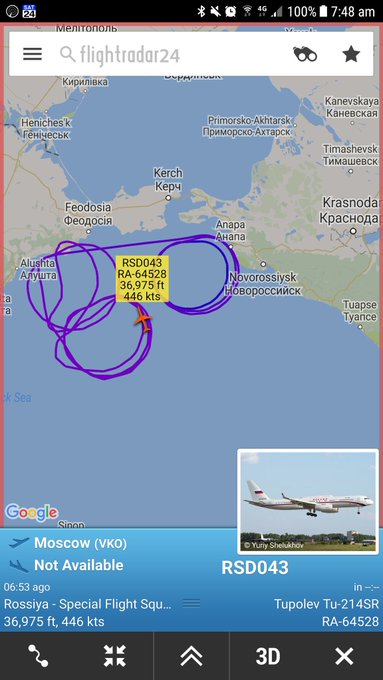A consensus is building that Russia has been experimenting with the ability to override Global Positioning System signals with fake ones that can severely disrupt and confuse the geolocation abilities of GPS users. For now this phenomenon has mainly affected ships traversing the Black Sea, but during a time of conflict it could impact a wide spectrum of combat systems including drones, missiles, smart bombs, as well as surface combatants and land warfare units. Even manned aircraft may not be immune to such electronic warfare tactics.
But spoofing isn't as simple as telling a GPS receiver it is somewhere totally different than where it really is. By broadcasting false GPS data that slowly changes over time, navigational systems with GPS and INS may not "throw out" the GPS data so soon, or at all for that matter. Over time this could result in vehicles going far off course or even running into shores, mountains or even other vehicles without warning. Some say this is how the Iranians brought down the RQ-170 Sentinel drone in a relatively intact state in late November 2011, although this remains highly debatable.
This all started on June 22nd when a ship near the Russian port of Novorossiysk reported a major miscalculation with their high-end GPS installation. New Scientist states:
"On 22 June, the US Maritime Administration filed a seemingly bland incident report. The master of a ship off the Russian port of Novorossiysk had discovered his GPS put him in the wrong spot – more than 32 kilometers inland, at Gelendzhik Airport.After checking the navigation equipment was working properly, the captain contacted other nearby ships. Their AIS traces – signals from the automatic identification system used to track vessels – placed them all at the same airport. At least 20 ships were affected.While the incident is not yet confirmed, experts think this is the first documented use of GPS misdirection – a spoofing attack that has long been warned of but never been seen in the wild."
Maritime-executive.com has a more thorough account of the incident you can read here. The commander of the ship that reported the strange occurrence documented it thoroughly.
As New Scientist points out, GPS spoofing seems to be something Russia has been playing with in a major way before this anomaly occurred in the northern Black Sea region. Reports that GPS users around Moscow, and especially near the Kremlin, have had similar issues, with the peculiar GPS behavior being discovered in a most unusual way:
"Over the past year, GPS spoofing has been causing chaos for the receivers on phone apps in central Moscow to misbehave. The scale of the problem did not become apparent until people began trying to play Pokemon Go. The fake signal, which seems to center on the Kremlin, relocates anyone nearby to Vnukovo Airport, 32 km away. This is probably for defensive reasons; many NATO guided bombs, missiles and drones rely on GPS navigation, and successful spoofing would make it impossible for them to hit their targets."
Insidegnss.com elaborates further on Russia's affinity for GPS denial tactics:
"With more than 250,000 cell towers in Russia equipped with GPS jamming devices as a defense against attack by U.S. missiles, the country has advanced capabilities to disrupt GPS. There have been press reports of Russian GPS jamming in both Moscow and the Ukraine. In fact Russia has boasted that its capabilities “make aircraft carriers useless,” and the U.S. Director of National Intelligence recently issued a report that stated that Russia and others were focusing on improving their capability to jam U.S. satellite systems, according to the RNT Foundation."
GPS jamming, or the loss of GPS altogether, has long been a major concern of the US military. One highly publicized yet at the same time shadowy drill led to warnings that GPS blackouts and disruptions would emanate from the Mojave Desert and reach hundreds of miles in every direction. Other elaborate testing and systems development programs have increased in frequency and scope regarding operating in GPS denied environments. This includes a cocktail of new technologies that can offer similar geolocation capabilities to GPS without the need for a constellation of satellites above.
Still, wide-area GPS jamming or outages are easy to detect, but spoofing GPS signals is a much more insidious threat, especially if spoofing effects are localized in nature. New Scientist states:
"...It can now be done with commercial hardware and software downloaded from the Internet. Nor does it require much power. Satellite signals are very weak – about 20 watts from 20,000 miles away – so a one-watt transmitter on a hilltop, plane or drone is enough to spoof everything out to the horizon."
Advanced guidance and navigation systems, like those found on aircraft and in most GPS-guided weapons, use inertial navigation with embedded GPS. System software loaded onto the INS/GPS guidance system uses algorithms to detect discrepancies among various steams of information. This way the system can place less priority on one stream of information, say from a malfunctioning ring-laser gyro or GPS receiver, than others. Or it can discount that steam entirely if it starts straying far from the consensus of the others. This way a navigation system that suddenly loses a component due to failure or has one of its data streams deviate for other reasons won't simply stop working.
For instance, if the GPS telemetry suddenly leaps miles away, the navigation system may "vote out" the GPS information entirely. The system will be less accurate overall because of it, but it will still function. As an example, take a Joint Direct Attack Munition, the most common guided bomb used by the USAF, which uses GPS and INS navigation. If the system suddenly loses GPS connectivity during its attack sequence, INS will take over, but the bomb will be substantially less accurate than it would have been with both GPS and INS working together as a team.
 |
| JDAM has a tailkit with moving fins, a GPS antenna and a GPS/INS autopilot. |
As for what emitter or platform that may have caused the disruption, we don't know for sure. But it is interesting to note that a Tu-214SR strategic communications relay aircraft was deployed to Crimea shortly before the incident took place, and has been flying regular circles over the northern Black Sea ever since. It's possible the aircraft is capable of rebroadcasting fake GPS signals aside from its primary duties, or at least is experimenting with the capability in region.
As you can see, this new form of electronic warfare is powerful and potentially quite deadly. The big question is how or when would Russia use it as a weapon? It seems that it fits well into Moscow's hybrid warfare playbook, as it could disrupt the navigation of unfriendly forces and even impact their ability to target Russian forces. It could also disrupt commerce and air travel all while the hostile emitter stays safely in Russian territory.
On a peer state warfare level, such as in a conflict against NATO, this technology could not only protect Russian forces from kinetic attacks by weapons that use GPS, but it could also disrupt any allied operations that relies heavily on GPS for navigation today. Even logistics to support such an operation could also be negatively affected.
Basically, the US military, and much of the world's transportation and commerce, runs on GPS. If anything else this incident in the Black Sea is a stark reminder of why the Pentagon needs to wean itself off this dependency as soon as possible. This possible event also doesn't take into account other avenues of attack a foreign power has to disrupt the GPS network, which includes cyber-intrusion or even attacking GPS satellites directly. Anti-satellite capabilities have become far more exotic, hard to detect, and more numerous than they once were. And even electronic warfare targeting GPS satellites doesn't have to be terrestrial in origin. Jamming tactics can be deployed in space between orbiting objects.
Among all this uncertainty, one thing is for sure—during a major conflict, GPS will be a prime strategic target. Considering the technology to disrupt or spoof its signals is becoming ever more accessible, non-state actors will likely take advantage of it too for nefarious purposes. For instance, just think of this tactic's implications when it comes to a concept like self-driving cars.
With all this in mind, preparing for a world where GPS connectivity is not guaranteed may not be convenient, but it may be entirely necessary.







 Russian Special Flight Squadron
Russian Special Flight Squadron
No comments:
Post a Comment